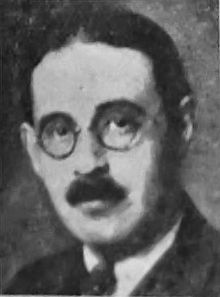Harold Laski
Harold Joseph Laski (born June 30, 1893 in Manchester , † March 24, 1950 in London ) was a British political scientist , economist , author and lecturer, and chaired the Labor Party between 1945 and 1946.
Life
His father, Nathan Laski, was a cotton merchant and leader of the Jews in Manchester. After going to school there, Laski studied eugenics in London (1911) and at New College in Oxford . From 1922 to 1936 he became a member of the socialist Fabian Society and in 1936 also joined the Labor Executive Committee, in 1945 he was its chairman.
From 1914 to 1916 Laski was a lecturer at McGill University in Montreal, then at Harvard, and from 1920 at the London School of Economics . In 1926 he became a professor of political science here and remained so until his death. He was with Oliver Wendell Holmes Jr. , Louis Brandeis , Felix Frankfurter and Franklin D. Roosevelt be friends. From 1929 to 1934 Laski worked on various government committees. In the run-up to World War II, he supported the Popular Front in France and the Socialist League under Richard Stafford Cripps .
By resolution of the National Executive Committee of the Labor Party, Laski wrote a historical introduction to the Communist Manifesto in the spring of 1947 on the occasion of the centenary of the Communist Manifesto "The Labor Party admitted" by publishing this century edition of the Communist Manifesto with the valuable historical introduction Professor Laskis " recognize how committed they are to Marx and Engels, both of whom are the intellectual authors of the entire labor movement "
One of his better known works is Reflections on the Revolution of Our Time . He is best known for developing and formulating the pluralism theory of democracy .
Bibliography (selection)
- Studies in the Problem of Sovereignty. (PDF; 397 kB) 1917.
- Authority in the Modern State. (PDF; 1.0 MB) 1919, ISBN 1-58477-275-1 .
- Political Thought in England from Locke to Bentham. 1920.
- Karl Marx. 1921.
- Communism. 1927.
- Liberty in the Modern State. 1930.
- Democracy in Crisis. 1933.
- The American Presidency. 1940.
- Reflections On the Revolution of our Time. 1943.
- Faith, Reason, and Civilization. 1944.
- The American Democracy. 1948.
- Communist manifesto. Socialist landmark. A new appreciation written for the Labor Party , London, George Allen and Unwin Limited, 1948
literature
- Ralf Dahrendorf , Colin Crouch : Laski, Harold Joseph. In: Wilhelm Bernsdorf , Horst Knospe (Ed.): Internationales Soziologenlexikon. Volume 1: Articles on sociologists who died by the end of 1969. 2nd revised edition. Enke, Stuttgart 1980, ISBN 3-432-82652-4 , p. 232 f.
Web links
- Literature by and about Harold Laski in the catalog of the German National Library
- Newspaper article about Harold Laski in the 20th century press kit of the ZBW - Leibniz Information Center for Economics .
Individual evidence
- ↑ Introduction to the Communist Manifesto by Professor Harold Laski . With the original text of the manifesto and the prefaces by Karl Marx and Friedrich Engels, Hamburg, 1949, 102 pages. Authorized translation from English by Ernst and Margarete Hollmann, p. 7.
- ↑ Introduction to the Communist Manifesto by Professor Harold Laski . With the original text of the manifesto and the prefaces by Karl Marx and Friedrich Engels, Hamburg, 1949, 102 pages. Authorized translation from English by Ernst and Margarete Hollmann, p. 5.
| personal data | |
|---|---|
| SURNAME | Laski, Harold |
| ALTERNATIVE NAMES | Laski, Harold Joseph (full name) |
| BRIEF DESCRIPTION | British political scientist, economist, author and lecturer |
| DATE OF BIRTH | June 30, 1893 |
| PLACE OF BIRTH | Manchester |
| DATE OF DEATH | March 24, 1950 |
| Place of death | London |
